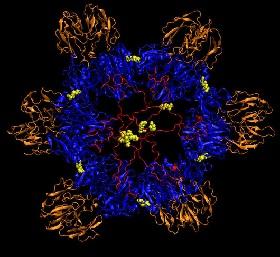Using AI to control energy for indoor agriculture
30 September 2024
Published online 24 November 2011

Autoimmune diseases — in particular, Behçet's disease — in which the body's immune system goes into overdrive attacking healthy cells, are a growing problem in the Middle East. A newly developed molecule, described in Scientific Reports, could help treat sufferers.
A current treatment for people suffering autoimmune diseases is intravenous injections of the immunoglobulin antibody IgG donated by healthy individuals. "Although this is effective, screening and purifying the donated blood is expensive," says Richard Pleass at the Liverpool School of Tropical Medicine (LSTM), UK. "A lot of medical centres in the Middle East and Africa can't afford this treatment, so biologists are keen to develop an artificial alternative to IgG."
Pleass and colleagues — including Marwa El-Faham at the University of Alexandria, Egypt — have developed a molecule that could be used as such a replacement. They fused together five IgG antibody molecules to mimic the larger shapes of antibody complexes found naturally in healthy immune systems. "Instead of five small antibody molecules whispering signals to the immune system, you get one huge molecule shouting loudly," says team member David Mekhaiel, also at LSTM. When injected into mice, the fused molecule suppressed the immune system's tendency to produce antibodies. This alternative is significantly more effective and less immunogenic than using monomers.
The team now plans to test how effective the molecule is against a specific autoimmune disease, idiopathic thrombocytopenic purpura, in mice, before moving into human clinical trials. They are also investigating whether molecules made by fusing other types of antibodies could have the opposite effect — kick-starting the immune system. "Those fused molecules could be used to create vaccines, against malaria, for instance," says Mekhaiel.
doi:10.1038/nmiddleeast.2011.157
Stay connected: